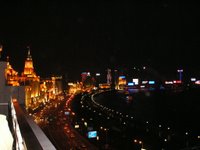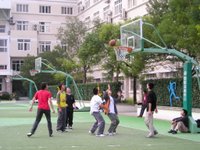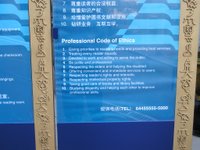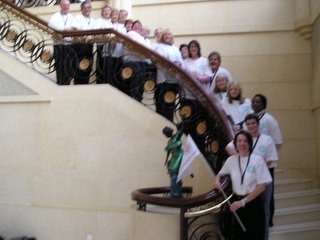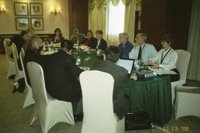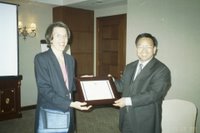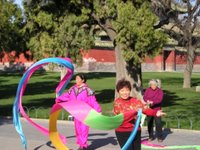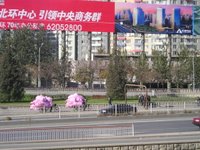Career Development delegate notes, part 2: Career development in China’s Universities
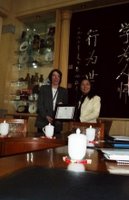
(See entry for November 18, 2005 for earlier report.)
(photo of Prof. Zhijin Hou, PhD Pschology and teaching courses in Career Development Counseling at Beijing Normal University)
Throughout our travels with our national interpreter and our visits with four career development examples in China today, delegation members began to understand the importance of family as the essential unit of Chinese society. Yet, with these visits and briefings from our national interpreter, we were also reminded that the relationship among family members is changing from control to equality, from obedience to democracy. Transitions are happening on the state level as well: a move from a centralized authority to a gradual move towards reform and a new open-door policy. The national focus is switching from class struggle to economic construction. China is moving towards a willingness to be a friend of other countries in spite of political differences. As I wrote earlier, with our meeting with a representative from the Chinese Ministry of Labor, we were to understand that there is a definite transition from a planned economy to a market economy - distribution of profits is no longer even.
Dramatic changes such as these are happening in people’s daily life, and we could sense this change through our introduction to career development initiatives in Beijing and Shanghai.
PROFESSIONAL PROGRAM: Career Development in China’s Universities
Peking University’s Guiding and Serving Center for Student’s Employment,
and Beijing Normal University.
The activities offered through the Career Centers of these two major universities share many similarities.
Peking University is a comprehensive and national university. The University consists of 30 colleges and 12 departments. Peking University has become a center for teaching and research and a university of the new type, consisting of diverse branches of learning such as pure and applied sciences, social sciences and the humanities, and sciences of management and education.
Beijing Normal University is one of China’s major teacher training institutions.
The Career Centers at Peking University and Beijing Normal University provide two main services:
Information on the types of jobs in the job market today by connecting students to employers through job fairs. Internships and cooperative experiences are encouraged as well in order to assist students in getting experience outside the curriculum, and to network students to potential employers.
At Peking University, a career information network consists of:
- self-study
- career exploration
- continuing your education (perhaps even overseas)
- assessments on the internet (but cannot play an important role because they have not been shown how to evaluate these assessments)
- a web site which introduces students to private enterprises looking to hire
The other major service focuses on how to fill out the Employment Contract. Apparently, this is a major responsibility of the Career Centers due to the length and complexities of this document - a document that all students must fill out in order to finalize the hiring process and to establish legal residency at their new work location after graduation.
Each year universities are responsible for providing detailed information to the Ministry of Education on every student that graduates, which includes their career goals. The University Career Center is engaged with this type of reporting.
We learned that each department in the University has a person who is in charge of knowing what careers exist for that major, and knowing about each student in that major. This person makes the contacts with employers to encourage visits to the school to share information about career options in the major.
Even though it seems, therefore, that the Career Centers primary focus is job placement, and providing instruction on how to fill out contracts, the Career Centers are beginning to offer career development assistance as well.
At Beijing Normal University, for instance, our delegation met with Professor Zhijin Hou who was specifically trained in western style career counseling and development. She received her Master of Psychology from Beijing Normal University, and a Doctor of Psychology Consultation from the Chinese University of Hong Kong. She currently serves as Associate Professor at Beijing Normal University, teaching courses in Career Development and Consultation. She is also a Certified Trainer through the National Career Development Association.
She trained with James P. Sampson, Jr., Ph.D.(a well known research career theorist and trainer in career development) at the Center for the Study of Technology in Counseling and Career Development, Florida State University. The training also focused on facilitator in Global Career Development.
Super’s Career Development Theory and Krumboltz's Social Learning Theory are two career development theories that she learned about while at the Career Center, and works within these theories today at Beijing Normal University.
Professor Zhijin Hou mentioned that since 1999, students are required more and more to find their own job.
She stated that with the State pulling out of job placement, students are facing a great deal of job uncertainty as a result. Today, the career centers in both Peking University and Beijing Normal University are attempting to provide students with more information and knowledge about career options.
Ms. Hou said that the government is very supportive of career development and encourages Universities to provide career counseling and planning courses. In fact, she said that it is now written into the Government’s Education Plan. People are more aware that there is a need to help students learn about what they want to do. There is research going on in many of China’s universities today, concerning career choice and self-efficacy and social learning theory. But, China does not have enough teachers/counselors trained as yet, to address the growing need for career counseling in the universities.
When a student manages to pass the national exam to enter into University, they are required to know ahead of time what major they want to study. Career counseling is not available at the high school level, so students are primarily picking majors based on current trends, perceived status of the occupation and families stressing high prestige occupations. Students get one chance to change their major at university, but they must have a strong academic record to do so.
The majors in China today that are considered competitive are; English; Math and Finance, MBA, Law; Security; Electronics Research; University Professor.
Yet, Ms. Hou stated that many students do not care what their major will be, because it is still more important to get accepted by top universities in the country first.
She said that the Career Center at Beijing Normal University however, does seek to provide students much more than just placement services. Because of Professor Zhijin Hou’s particular training in western Career Development theory, assessments like the Holland and the MBTI are now available for students to take. Other career assessments in use in the U.S. are not available in China as yet because they have not been ‘normed’ to the Chinese work and life values. Aptitude and skills assessments are available, as are co-op education and internship opportunities, which also assist students in getting short and long term experience with career exploration.
Both Career Centers also try to help students with job search strategies. Ms. Hou said that students tend to write one resume and ‘broadcast’ it everywhere – something delegates were not surprised to hear, given similar approaches taken by students in America. She said that, instead, her staff works with students to write several types of resumes for each job they are applying for. Employers are looking for similar traits in future employees that employers here in America look for: academic competency of the student, yes, but more importantly, how the student performs in the interview – social skills are ranked high - that is – employers want to know how well will the student ‘fit’ the culture of the company and get along with co-workers.
Just recently, the career center has added a course in career planning for first and second year students. For seniors, the mock interview is now part of job search strategies.
In China today, students will leave positions they are unhappy with. When they do, they tend to return to the counseling centers, rather than the career center for assistance and support.
Both Beijing and Beijing Normal University support a Student Association for Career Development. The idea of students helping students with career exploration, job search strategies and overall support, was quite intriguing for most delegates. And, it was noted that the career center staff is promoting the idea of offering what Ms. Huo explained to us, the idea of providing a large space in which to decide – to give a wide breath and depth to explore career options. Students are encouraged to take courses in career planning when they first come to University so they can begin to explorer career options. She was delighted to hear that counselors in America stress the same idea.
The students working in the Career Center we met at Beijing Normal University stated that they feel they have more freedom to choose careers closer to their own interests irrespective of societal/parental values. With the growth of private enterprise, there will be more career choices to explore than ever before.
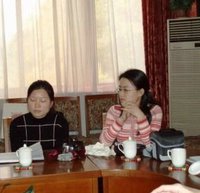 The students working with the Student Association receive support from professional staff at Beijing Normal University to get involved in career research; to invite employers to give lectures; to help with providing practice interviews and writing the resume and cover letter; provide a bulletin board on the internet for students to post questions, create dialogue between and among students. Students offer basic strategies assistance in career exploration to fellow students as well. They have even created a career library for fellow students to use. They did this by going to organizations to speak about career development and raise the necessary funds. The association was founded in 2003. Today, the student Association has 400 members. The students in this meeting told us that students nowadays like to depend on themselves to make their own career decisions. In a sense they have to, since the primary purpose of the career center is still job placement.
The students working with the Student Association receive support from professional staff at Beijing Normal University to get involved in career research; to invite employers to give lectures; to help with providing practice interviews and writing the resume and cover letter; provide a bulletin board on the internet for students to post questions, create dialogue between and among students. Students offer basic strategies assistance in career exploration to fellow students as well. They have even created a career library for fellow students to use. They did this by going to organizations to speak about career development and raise the necessary funds. The association was founded in 2003. Today, the student Association has 400 members. The students in this meeting told us that students nowadays like to depend on themselves to make their own career decisions. In a sense they have to, since the primary purpose of the career center is still job placement.It was also noted that the Career Center at Beijing Normal University won the creativity challenge award in all of China for their efforts to promote career counseling to fellow students!
A period for questions and answers followed the presentation
Our Chinese counterparts wanted to know if faculty get involved in career counseling. It was referred to as offering centralized services or decentralized. That is, career services provided through a centralized office, like a career center, or, also provided by professors, other professional staff and even graduate students.
I was interested to learn that the answer was yes, by many of the delegates representing a variety of Colleges and Universities in the U.S. Our China counterparts told us this was certainly the case at their university, since the idea of Career Development Center is still new.
Likewise, we asked our counterparts and the students who work in the Center, why they got involved in career development. It was assuring to find out that the reason was not too dissimilar from many of the delegates. Students and professors both stated that their reason to get involved with career development is because they want to help others, especially those struggling with career choice and even career satisfaction, because they too have had the same issues to face in choosing a major and career, and want to help support others in this process as well.
But what about the millions of laid off workers, the moving people (farmers leaving their farms) and others not engaged in university? If the government is moving towards developing fewer state enterprises and providing private enterprise support instead, how will all the millions of Chinese not engaged in university training find jobs on their own?
The next report will focus on two more professional visits: a private career development consulting firm and a State-run community service center of employment in Shanghai.
